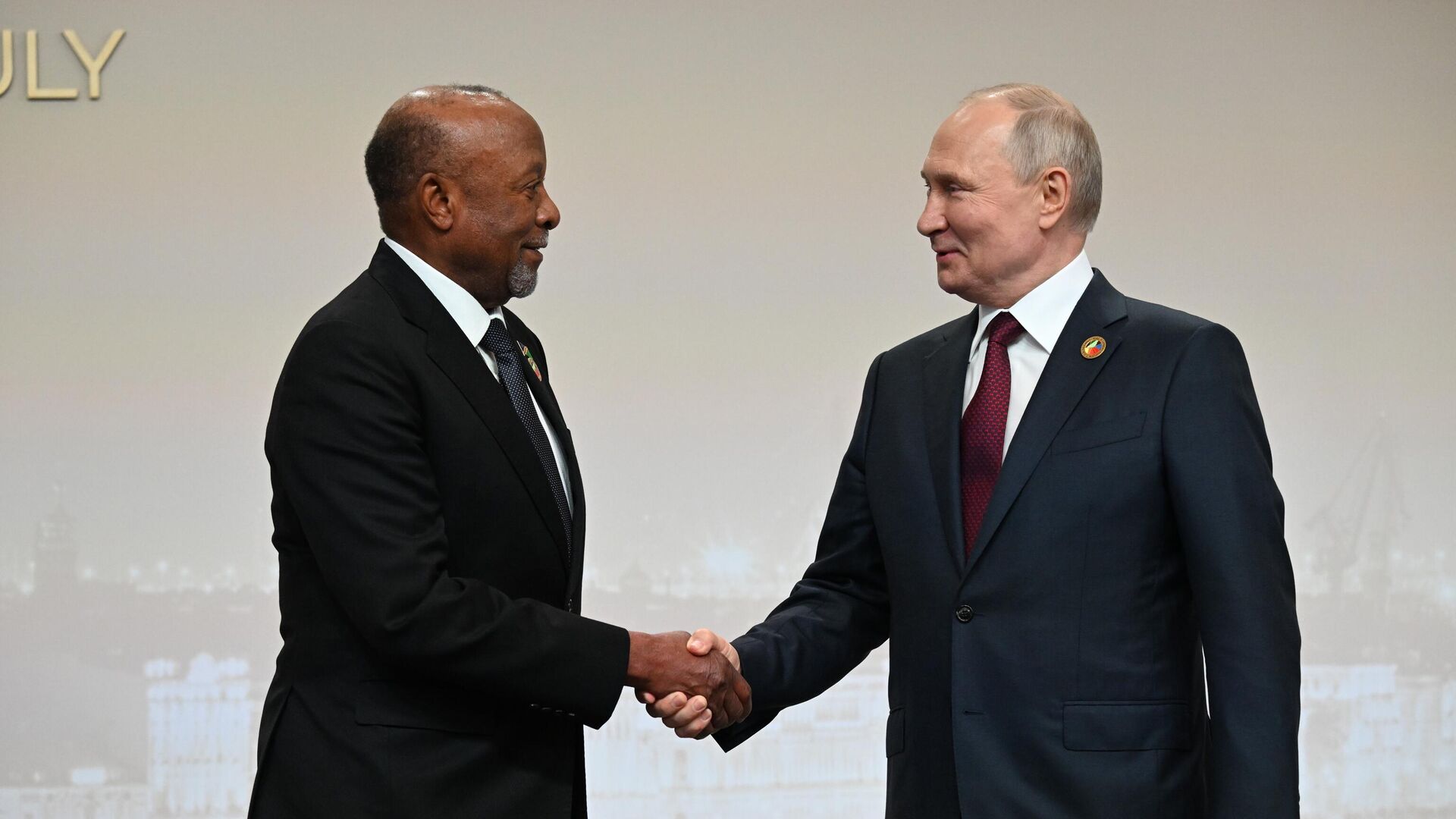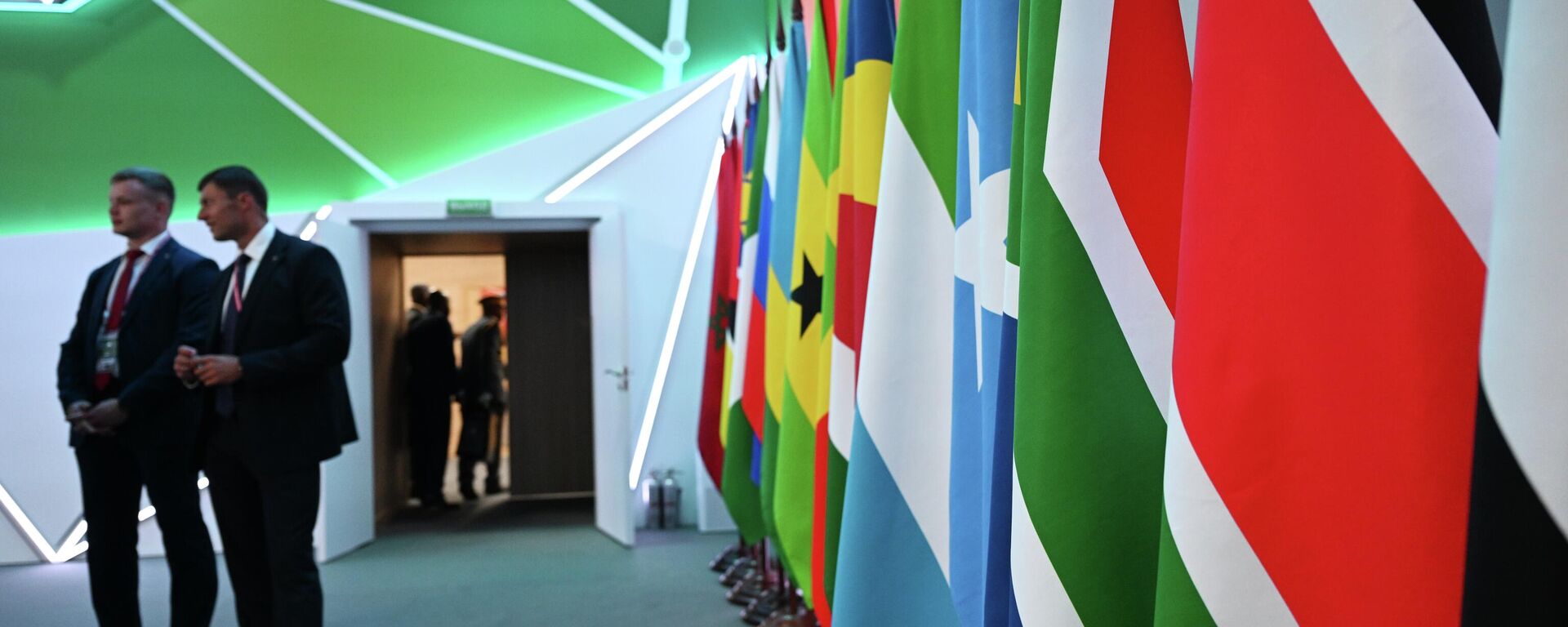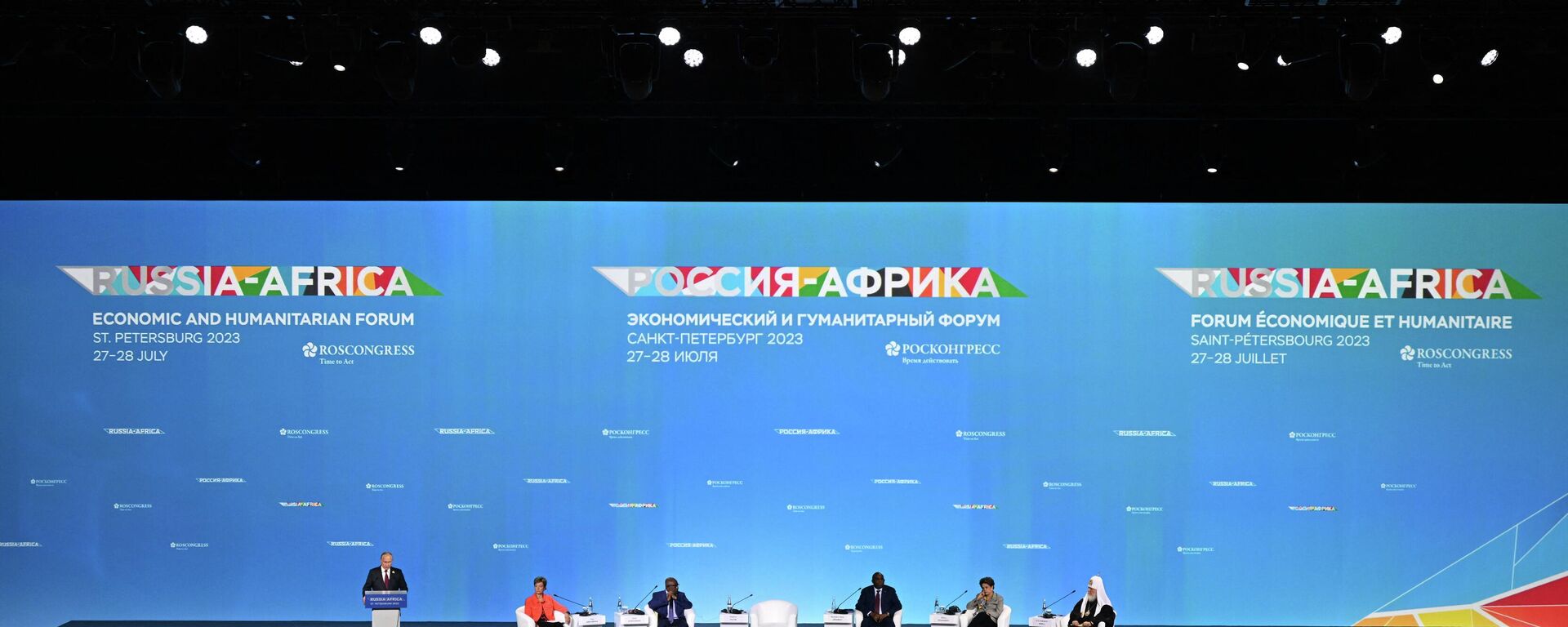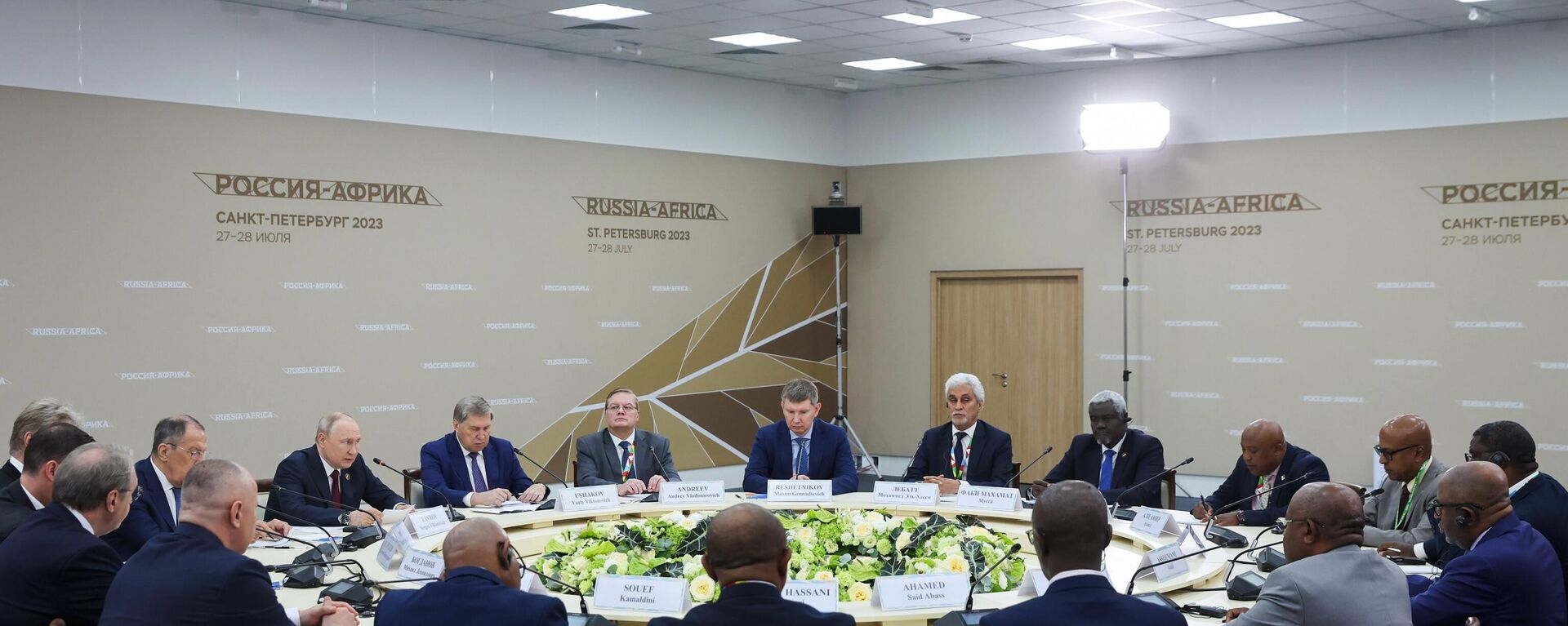https://en.sputniknews.africa/20230729/we-should-live-up-to-africas-weight-namibian-vice-president-1060892695.html
'We Should Live Up to Africa's Weight': Namibian Vice President
'We Should Live Up to Africa's Weight': Namibian Vice President
Sputnik Africa
Namibian Vice President Nangolo Mbumba recently attended the second Russia–Africa Summit, which took place in St. Petersburg on July 27-28. The summit brought... 29.07.2023, Sputnik Africa
2023-07-29T16:13+0200
2023-07-29T16:13+0200
2023-07-29T16:26+0200
southern africa
namibia
nangolo mbumba
second russia–africa summit
russia
russia-africa cooperation
african russia-ukraine peace initiative
trade
colonialism
https://cdn1.img.sputniknews.africa/img/07e7/07/1d/1060907390_0:0:3072:1728_1920x0_80_0_0_25324571c91875aecf645efb50273440.jpg
African countries should promote development and become self-sufficient through cooperation with friendly partners around the world in order to defend their freedom, independence and sovereignty, said Namibian Vice President Nangolo Mbumba.The official made the statement while addressing the role of the African continent in a multipolar global architecture in an exclusive interview with Sputnik on the sidelines of the second Russia–Africa summit, which took place in the Russian city of St. Petersburg on July 27-28.Africa's Role in the Global ArchitectureMbumba, who led his country’s delegation to the summit, said that Africa is a huge continent that should live up to its weight and potential, and develop its economy, infrastructure, education and health systems.Mbumba also praised Russia's role in the anti-colonial struggle of the African countries, quoting Russian President Vladimir Putin as saying, "Independence is something you have to defend every day." The African official argued that there may be attempts by other countries to undermine or exploit Africa's resources and interests.He added that African nations need "to remain vigilant, to remain awake, and to defend it in every respect from food production, education of our children to health of our people, and to every territorial inch of the African continent to remain free and independent."Boosting Russian-Namibian Trade Turnover and CooperationTalking about the Russia-Namibia relations, the vice president also expressed his hope that the trade turnover between the two countries, which stood at $13.8 million in 2021, could be increased in the future by focusing on various sectors, such as uranium mining, beef production, fish exports and tourism.Namibia is the world's second and Africa's biggest producer of uranium, and has granted Russia's Rosatom subsidiary, One Uranium, exploration rights in 2019.However, in late December 2022, the Namibian government halted One Uranium's exploration activities due to environmental concerns and refused to grant the company a water use permit, which is required for mining. The government stressed that the Russian company could resume operations if it proved that its uranium extraction method, known as in-situ leaching, would not lead to potential contamination of underground water.VP Mbumba also said that Namibia wants to open up the market for its beef products in Russia, and that the African country is already selling fish to its partner. Furthermore, the vice president expressed interest in developing the tourism sector by inviting Russian companies or individuals to build hotels in Namibia, offering a winter getaway for Russian tourists.The official added that attracting Russian investments in various fields, including energy, is a priority for Namibia. He reiterated the Namibian finance minister's statement on this matter and emphasized the government's commitment to creating an environment conducive to investment.The agriculture sector, in particular, was highlighted as an area where technological advancements and equipment from Russia could greatly enhance productivity.The African Peace Initiative on the Ukraine ConflictRegarding the Ukrainian conflict, Mbumba noted that the African delegation had discussions with Russian President Vladimir Putin regarding a peaceful resolution to the ongoing conflict between Russia and Ukraine.While Namibia's president did not participate personally, Mbumba noted the varied regional responsibilities taken on by African leaders.Despite divergent perspectives, Mbumba acknowledged the importance of negotiation between the conflicting sides to seek peaceful resolutions and mitigate tensions.On June 16, a delegation of seven African countries, including the Presidents of Zambia, Comoros, Senegal, South Africa, the Prime Minister of Egypt, and representatives of the Republic of Congo and Uganda, visited Kiev and held talks with Ukrainian President Volodymyr Zelensky.The following day, the African mission was received by the Russian President in St. Petersburg. On behalf of the delegation, the South African president then outlined a plan of 10 principles for the peace process in Ukraine.It awas repaetedly noted that the mission was the first one of the kind to be accepted both by Russia and Ukraine.Later, the leaders of the peace mission engaged with Russian President Putin on July 28, the second day of the 2023 Russia–Africa Summit. The Kremlin deemed the discussion "productive".
https://en.sputniknews.africa/20230729/russiaafrica-forum-outcomes-action-plan-20232026-1060896627.html
https://en.sputniknews.africa/20230729/second-russiaafrica-summit-full-final-declaration-1060891753.html
https://en.sputniknews.africa/20230729/african-leaders-discuss-ukraine-initiative-with-putin-statement-being-prepared-1060892027.html
southern africa
namibia
russia
Sputnik Africa
feedback@sputniknews.com
+74956456601
MIA „Rossiya Segodnya“
2023
Muhammad Nooh Osman
https://cdn1.img.sputniknews.africa/img/07e7/04/0a/1058467512_0:0:1280:1280_100x100_80_0_0_ec723833bcbfcaed2e21952965ad99e4.jpg
Muhammad Nooh Osman
https://cdn1.img.sputniknews.africa/img/07e7/04/0a/1058467512_0:0:1280:1280_100x100_80_0_0_ec723833bcbfcaed2e21952965ad99e4.jpg
News
en_EN
Sputnik Africa
feedback@sputniknews.com
+74956456601
MIA „Rossiya Segodnya“
Sputnik Africa
feedback@sputniknews.com
+74956456601
MIA „Rossiya Segodnya“
Muhammad Nooh Osman
https://cdn1.img.sputniknews.africa/img/07e7/04/0a/1058467512_0:0:1280:1280_100x100_80_0_0_ec723833bcbfcaed2e21952965ad99e4.jpg
southern africa, namibia, nangolo mbumba, russia, russia-africa cooperation, african russia-ukraine peace initiative, trade, colonialism
southern africa, namibia, nangolo mbumba, russia, russia-africa cooperation, african russia-ukraine peace initiative, trade, colonialism
'We Should Live Up to Africa's Weight': Namibian Vice President
16:13 29.07.2023 (Updated: 16:26 29.07.2023) Muhammad Nooh Osman
Writer/Editor
Exclusive
Namibian Vice President Nangolo Mbumba recently attended the second Russia–Africa Summit, which took place in St. Petersburg on July 27-28. The summit brought together African leaders and senior officials, as well as representatives of business, NGOs and academia, to discuss ways to enhance cooperation between Russia and Africa.
African countries should promote development and become self-sufficient through cooperation with friendly partners around the world in order to defend their freedom, independence and sovereignty, said Namibian Vice President Nangolo Mbumba.
The official made the statement while addressing the role of the African continent in a multipolar global architecture in an exclusive interview with Sputnik on the sidelines of the second Russia–Africa summit, which took place in the Russian city of St. Petersburg on July 27-28.
Africa's Role in the Global Architecture
Mbumba, who led his country’s delegation to the summit, said that Africa is a huge continent that should live up to its weight and potential, and develop its economy, infrastructure, education and health systems.
"We have a responsibility. Africa is a huge continent, bigger than Europe, even bigger than America, the US and Canada, put together," the Namibian VP said. "So we should live up to that weight of the mother continent to make sure that we defend our own interests, that we cooperate with our friends."
Mbumba also praised Russia's role in the anti-colonial struggle of the African countries, quoting Russian President
Vladimir Putin as saying, "Independence is something you have to defend every day." The African official argued that there may be attempts by other countries to undermine or exploit Africa's resources and interests.
"President Putin, in one of our meetings today, said independence is something you have to defend every day. You don't gain it and then you go and sleep. You don't gain any and stand still," Mbumba said. "So the African continent is free. There will be attempts from other quarters to undermine us or to skillfully gain what belongs to us."
He added that African nations need "to remain vigilant, to remain awake, and to defend it in every respect from food production, education of our children to health of our people, and to every territorial inch of the African continent to remain free and independent."
Boosting Russian-Namibian Trade Turnover and Cooperation
Talking about the Russia-Namibia relations, the vice president also expressed his hope that the trade turnover between the two countries, which stood at $13.8 million in 2021, could be increased in the future by focusing on various sectors, such as uranium mining, beef production, fish exports and tourism.
"There are a lot of Russian companies in Namibia that are trying to explore uranium. They have found some areas where they think uranium is available," Mbumba told Sputnik. "We are hoping that one day they will hit the ground where there is no controversy as to how to mine that resource. That will boost up the export from our site."
Namibia is the world's second and Africa's biggest producer of uranium, and has granted Russia's
Rosatom subsidiary, One Uranium, exploration rights in 2019.
However, in late December 2022, the Namibian government halted One Uranium's exploration activities due to environmental concerns and refused to grant the company a water use permit, which is required for mining. The government stressed that the Russian company could resume operations if it proved that its uranium extraction method, known as in-situ leaching, would not lead to potential contamination of underground water.
"It is not anything against the company or investment," Namibia's Minister for Agriculture, Water, and Land Reform Calle Schlettwein told the media at the time. "It is the principle that we have to look at that guards against the possible contamination of a very important renewable resource."
VP Mbumba also said that Namibia wants to open up the market for its beef products in Russia, and that the African country is already selling fish to its partner. Furthermore, the vice president expressed interest in developing the tourism sector by inviting Russian companies or individuals to build hotels in Namibia, offering a winter getaway for Russian tourists.
The official added that attracting Russian investments in various fields, including energy, is a priority for Namibia. He reiterated the Namibian finance minister's statement on this matter and emphasized the government's commitment to creating an environment conducive to investment.
The agriculture sector, in particular, was highlighted as an area where technological advancements and equipment from Russia could greatly enhance productivity.
"Somebody was talking yesterday, the chief executive officer of Investment Promotion and Development Board was saying 'we need people with technology.' One of the things that delay our development in agriculture is that we don't have equipment, we don't have tractors, we don't have plows. So if we get them, we can create areas that are open for cattle to graze, and we will have more meat to market," he stated.
The African Peace Initiative on the Ukraine Conflict
Regarding the Ukrainian conflict, Mbumba noted that the African delegation had discussions with Russian President Vladimir Putin regarding a
peaceful resolution to the ongoing conflict between Russia and Ukraine.
While Namibia's president did not participate personally, Mbumba noted the varied regional responsibilities taken on by African leaders.
"Our president was not one of them for good reason, because some of our neighbors, we take regional responsibilities," he said. "There was a president from Senegal to the corner of West Africa. There was a president from Egypt to the north of the African continent. There was the president of South Africa, our neighbor."
Despite divergent perspectives, Mbumba acknowledged the importance of negotiation between the conflicting sides to seek peaceful resolutions and mitigate tensions.
On June 16, a delegation of seven African countries, including the Presidents of Zambia, Comoros, Senegal, South Africa, the Prime Minister of Egypt, and representatives of the Republic of Congo and Uganda, visited Kiev and held talks with Ukrainian President Volodymyr Zelensky.
The following day, the African mission was received by the Russian President in St. Petersburg. On behalf of the delegation, the South African president then
outlined a plan of 10 principles for the peace process in Ukraine.
It awas repaetedly noted that the mission was the first one of the kind to be accepted both by Russia and Ukraine.
Later, the leaders of the peace mission engaged with Russian President Putin on July 28, the second day of the 2023 Russia–Africa Summit. The Kremlin deemed the discussion "productive".






